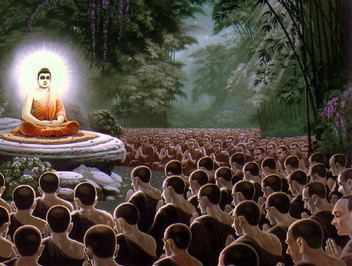|
|
| | 1 | 2 |
| 3 | 4 | 5 | 6 | 7 | 8 | 9 |
| 10 | 11 | 12 | 13 | 14 | 15 | 16 |
| 17 | 18 | 19 | 20 | 21 | 22 | 23 |
| 24 | 25 | 26 | 27 | 28 | 29 | 30 |
|
| |
|
|
|
|
|
|
|
|
วันมาฆบูชา (Magha Puja Day)

วันมาฆบูชา (บาลี: มาฆปูชา; อังกฤษ: Magha Puja) เป็นวันสำคัญทางพระพุทธศาสนาของชาวพุทธเถรวาทและวันหยุดราชการในประเทศไทย[1] "มาฆบูชา" ย่อมาจาก "มาฆปูรณมีบูชา" หมายถึงการบูชาในวันเพ็ญกลางเดือนมาฆะ ตามปฏิทินของอินเดีย หรือเดือน 3 ตามปฏิทินจันทรคติของไทย (มักอยู่ในช่วงเดือนกุมภาพันธ์ หรือเดือนมีนาคม) ถ้าในปีใดมีเดือน อธิกมาส คือมีเดือน 8 สองหน (ปีอธิกมาส) ก็เลื่อนไปทำในวันเพ็ญเดือน 3 หลัง (วันเพ็ญเดือน 4)
วันมาฆบูชา ได้รับการยกย่องเป็นวันสำคัญทางพระพุทธศาสนาเนื่องจากเหตุการณ์สำคัญที่เกิดขึ้นเมื่อ 2,500 กว่าปีก่อน องค์สมเด็จพระสัมมาสัมพุทธเจ้าทรงแสดงโอวาทปาฏิโมกข์ท่ามกลางที่ประชุมมหาสังฆสันนิบาตครั้งใหญ่ในพระพุทธศาสนา โดยมีเหตุการณ์สำคัญเกิดขึ้นพร้อมกัน 4 ประการ คือ พระสงฆ์สาวกที่มาประชุมพร้อมกันทั้ง 1,250 รูปนั้นได้มาประชุมกันยังวัดเวฬุวันโดยมิได้นัดหมาย, พระสงฆ์ที่มาประชุมทั้งหมดต่างล้วนเป็น "เอหิภิกขุอุปสัมปทา" หรือผู้ได้รับการอุปสมบทจากพระพุทธเจ้าโดยตรง, พระสงฆ์ทั้งหมดที่มาประชุมล้วนเป็นพระอรหันต์ผู้ทรงอภิญญา 6, และวันดังกล่าวตรงกับวันเพ็ญมาฆปุรณมีดิถี ขึ้น 15 ค่ำ เดือน 3 ดังนั้นจึงมีคำเรียกวันนี้อีกคำหนึ่งว่า "วันจาตุรงคสันนิบาต" หรือ วันที่มีการประชุมพร้อมด้วยองค์ 4
เดิมนั้นไม่มีการประกอบพิธีมาฆบูชาในประเทศพุทธเถรวาท จนมาในสมัยของพระบาทสมเด็จพระจอมเกล้าเจ้าอยู่หัว (รัชกาลที่ 4) พระองค์ได้ทรงปรารภถึงเหตุการณ์ครั้งพุทธกาลในวันเพ็ญเดือน 3 ดังกล่าวว่า เป็นวันที่เกิดเหตุการณ์สำคัญยิ่ง ควรมีการประกอบพิธีทางพระพุทธศาสนาเพื่อเป็นที่ตั้งแห่งความศรัทธาเลื่อมใส จึงมีพระมหากรุณาธิคุณโปรดเกล้าฯ ให้จัดการพระราชกุศลมาฆบูชาขึ้น โดยการประกอบพระราชพิธีคงคล้ายกับวันวิสาขบูชา คือมีการบำเพ็ญพระราชกุศลต่าง ๆ มีการพระราชทานจุดเทียนตามประทีปเป็นพุทธบูชาในวัดพระศรีรัตนศาสดาราม และพระอารามหลวงต่าง ๆ เป็นต้น โดยในช่วงแรกพิธีมาฆบูชาคงเป็นการพระราชพิธีภายใน ยังไม่แพร่หลายทั่วไป จนต่อมาความนิยมจัดพิธีมาฆบูชาจึงได้ขยายออกไปทั่วราชอาณาจักร
ปัจจุบันวันมาฆบูชาได้รับการประกาศให้เป็นวันหยุดราชการในประเทศไทย โดยพุทธศาสนิกชนทั้งพระบรมวงศานุวงศ์ พระสงฆ์ และประชาชน จะมีการประกอบพิธีต่าง ๆ เช่น การตักบาตร การฟังพระธรรมเทศนา การเวียนเทียน เป็นต้น เพื่อเป็นการบูชารำลึกถึงพระรัตนตรัยและเหตุการณ์สำคัญดังกล่าว ที่ถือได้ว่าเป็นวันที่พระพุทธเจ้าทรงประทานโอวาทปาฏิโมกข์ ซึ่งกล่าวถึงหลักคำสอนอันเป็นหัวใจของพระพุทธศาสนา ได้แก่ การไม่ทำความชั่วทั้งปวง การบำเพ็ญความดีให้ถึงพร้อม และการทำจิตของตนให้ผ่องใส เพื่อเป็นหลักปฏิบัติของพุทธศาสนิกชนทั้งมวล
Māgha Pūjā or Makha Bucha is an important religious festival celebrated by Buddhists in Thailand, Cambodia, and Laos on the full moon day of the third lunar month (this usually falls in February). The third lunar month is known in the Thai language as Makha (Pali: Māgha); Bucha is also a Thai word (Pali: Pūjā), meaning "to venerate" or "to honor". As such, Makha Bucha Day is for the veneration of Buddha and his teachings on the full moon day of the third lunar month.
The spiritual aims of the day are: not to commit any kind of sins; do only good; purify one's mind.
Māgha Pūjā is a public holiday in Thailand, Laos and Cambodia - and is an occasion when Buddhists tend to go to the temple to perform merit-making activities.
It was nine full months after Buddha got Enlightenment, on the full-moon day of 6th lunar month, 45 year before the Buddhist era.
Magha Puja Day in Wat Khung Taphao, Uttaradit Province, Thailand.
Origin of Māgha Pūjā Day
Māgha Pūjā day marks the four auspicious occasions, which happened nine months after the Enlightenment of the Buddha at Veḷuvana Bamboo Grove, near Rājagaha in Northern India. On that occasion, as recorded in the commentary to the Mahāsamayasutta, DN-Comm 20) four marvellous events occurred:
1. There were 1,250 Arahata, that came to see the Buddha that evening without any schedule.
2. All of them were Arhantas, the Enlightened One, and all of them were ordained by the Buddha himself.
3. The Buddha gave those Arhantas principles of the Buddhism, called "The ovadhapatimokha". Those principles are: - To cease from all evil,- To do what is good,- To cleanse one's mind;
4. it was the full-moon day.
The Buddha gave an important teaching to the assembled monks on that day 2,500 years ago called the 'Ovādapātimokha' which laid down the principles of the Buddhist teachings. In Thailand, this teaching has been dubbed the 'Heart of Buddhism'.
Activities to be observed on Māgha Pūjā Day
1. In the evening of Magha full-moon day, each temple in Thailand holds a candle light procession called a wian tian (wian meaning circle; tian meaning candle). Holding flowers, incense and a lighted candle, the monks and congregation members circumambulate clockwise three times around the Uposatha Hall - once for each of the Three Jewels the Buddha, the Dharma, and the Sangha.
2. Tum Boon: Making merit by going to temples for special observances and join in the other Buddhist activities.
3. Rub Sil': Keeping the Five Precepts. Practise of renunciation: Observe the Eight Precepts, practise of meditation and mental discipline, stay in the temple, wearing white robes, for a number of days.
| Create Date : 15 เมษายน 2554 |
| Last Update : 15 เมษายน 2554 14:38:17 น. |
|
0 comments
|
| Counter : 1287 Pageviews. |
 |
|
|
|
|
|
|

